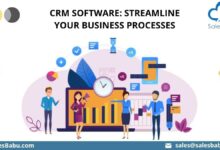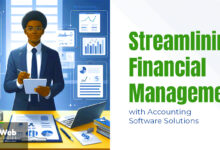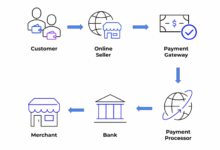Best ERP Software: Streamlining Business Operations With Efficiency
Best ERP software offers a comprehensive solution for businesses to enhance efficiency and streamline operations. Dive into the world of ERP systems to discover how they revolutionize the way companies manage their resources and processes.
Overview of ERP Software
ERP software, or Enterprise Resource Planning software, is a centralized system that helps businesses manage and integrate their core processes. This type of software allows organizations to streamline operations, improve efficiency, and make data-driven decisions.
Key Benefits of Using ERP Software
- Enhanced efficiency and productivity
- Improved accuracy and data visibility
- Cost savings through streamlined processes
- Better decision-making with real-time insights
Integration of Business Processes
ERP software integrates various functions such as finance, HR, supply chain, and customer service into a single platform. This allows for seamless communication and data sharing across different departments within an organization.
Common Features of ERP Software Systems
- Inventory management
- Financial management
- Human resources management
- Customer relationship management
Industries Using ERP Software
- Manufacturing
- Retail
- Healthcare
- Finance
Role of Cloud-Based ERP Solutions
Cloud-based ERP solutions offer scalability, flexibility, and accessibility for businesses of all sizes. They enable remote access, automatic updates, and data backup, making them ideal for modern businesses with distributed teams.
Importance of Data Security in ERP Software Implementations
Data security is crucial in ERP software implementations to protect sensitive information from unauthorized access. Encryption, user authentication, and regular security audits are essential to ensure the confidentiality and integrity of data within the system.
Types of ERP Software
ERP software comes in various types to cater to the diverse needs of businesses across different industries. Let’s explore the different types of ERP software available in the market and how they can benefit organizations.
Cloud-Based ERP vs. On-Premise Solutions
Cloud-based ERP software is hosted on remote servers and accessed through the internet, offering benefits such as lower upfront costs, automatic updates, and scalability. On the other hand, on-premise ERP solutions are installed locally on a company’s servers, providing more control over data but requiring higher initial investment and maintenance costs. When it comes to customization options, cloud-based ERP software often offers more flexibility compared to on-premise solutions.
Scalability for Businesses of Different Sizes
ERP software is designed to scale with businesses of all sizes. For small enterprises, features like basic inventory management and financial tracking are essential. Medium-sized businesses may require more advanced functionalities such as CRM integration and supply chain management. Large enterprises often need complex modules like enterprise asset management and business intelligence tools to manage their operations effectively.
Integration Capabilities with Other Systems
ERP software can integrate seamlessly with other systems like Customer Relationship Management (CRM), Human Resources (HR), and Business Intelligence (BI) tools. This integration streamlines processes, improves data accuracy, and enhances decision-making capabilities across different departments within an organization.
Implementation Process and Key Considerations
The implementation of ERP software is a critical process that requires careful planning and execution. Key considerations include defining clear objectives, involving stakeholders from different departments, ensuring data accuracy and security, providing adequate training for users, and selecting a reliable vendor with a proven track record of successful implementations. By addressing these considerations, organizations can maximize the benefits of ERP software and achieve a successful deployment.
Features to Look for in ERP Software
When selecting an ERP software system, it is crucial to consider various features that will optimize your business processes and enhance overall efficiency. Here are key features to look for:
Financial Management
Effective financial management is essential for any ERP software. Look for features that enable seamless tracking of expenses, revenue, budgeting, and financial reporting. Integration with banking systems for real-time updates is also beneficial.
Inventory Tracking
Accurate inventory management is crucial for businesses to avoid stockouts or overstocking. Look for ERP software that offers real-time tracking of inventory levels, automated reordering, and forecasting capabilities to optimize inventory management.
CRM (Customer Relationship Management)
CRM features in ERP software help businesses manage customer interactions, sales pipelines, and marketing campaigns effectively. Look for software that provides a centralized database for customer information, lead tracking, and customer engagement tools.
Human Resources Management
HR management features in ERP software streamline processes such as payroll, benefits administration, employee tracking, and performance evaluations. Look for software that offers self-service portals for employees, compliance management tools, and reporting capabilities.
Scalability and Integration Capabilities
Scalability is important as your business grows, so look for ERP software that can easily adapt to changing needs. Integration capabilities with other business systems, such as CRM, e-commerce platforms, and third-party applications, are also crucial for seamless data flow.
User Interface Simplicity and Ease of Navigation
An intuitive user interface and easy navigation are key for user adoption and productivity. Look for ERP software with a clean, user-friendly interface, customizable dashboards, and role-based access to ensure employees can easily navigate and utilize the system.
Industry-Specific Modules
Industry-specific modules in ERP software cater to the unique needs of various sectors such as manufacturing, healthcare, retail, and more. Look for software that offers specialized modules tailored to your industry, providing specific functionalities and compliance standards.
Key Stakeholders in ERP Software Implementation
Implementing an ERP software involves various key stakeholders who play crucial roles in the process. Each stakeholder has specific responsibilities to ensure the successful deployment and utilization of the ERP system.
1. Executive Sponsor
The executive sponsor is typically a high-level executive within the organization who champions the ERP implementation project. Their role is to provide strategic direction, secure necessary resources, and ensure alignment with the organization’s goals and objectives.
2. Project Manager
The project manager is responsible for overseeing the entire ERP implementation project. They coordinate activities, manage timelines, allocate resources, and ensure that the project stays on track and within budget.
3. IT Team
The IT team is responsible for the technical aspects of the ERP implementation, including system configuration, data migration, customization, integration with existing systems, and ongoing maintenance and support.
4. End Users
End users are the employees who will use the ERP system on a daily basis. Their role is to provide feedback, undergo training, adapt to new processes, and ensure the effective utilization of the ERP software to improve operational efficiency and productivity.
5. Vendors and Consultants
Vendors and consultants provide expertise in ERP software selection, implementation, and customization. They work closely with the internal team to design and deploy the ERP system according to the organization’s requirements and industry best practices.
Top ERP Software Providers
When it comes to choosing an ERP software provider, it is essential to consider the industry’s top players. Below are some of the best ERP software companies in the industry, along with their unique selling points and pricing models.
SAP
SAP is one of the leading ERP software providers globally, offering a comprehensive suite of solutions for businesses of all sizes. Their unique selling point lies in their ability to provide end-to-end integration across various departments and functions. SAP’s pricing model typically involves a combination of upfront license fees and ongoing support and maintenance costs.
Oracle NetSuite
Oracle NetSuite is known for its cloud-based ERP solutions, which are scalable and customizable to meet the unique needs of each business. Their unique selling point is the flexibility and agility their software offers, allowing businesses to adapt quickly to changing market conditions. Pricing for Oracle NetSuite is usually subscription-based, with additional costs for implementation and customization.
Microsoft Dynamics 365
Microsoft Dynamics 365 provides a suite of ERP solutions that integrate seamlessly with other Microsoft products, such as Office 365 and Azure. Their unique selling point is the familiarity and ease of use for businesses already using Microsoft products. Pricing for Microsoft Dynamics 365 varies based on the specific modules and features required by the business.
Infor ERP
Infor ERP offers industry-specific solutions tailored to the needs of manufacturing, distribution, retail, and other sectors. Their unique selling point is the depth of functionality and customization options available in their software. Infor ERP typically offers a flexible pricing model based on the modules and deployment options chosen by the business.
Epicor
Epicor provides ERP solutions designed for industries such as manufacturing, distribution, retail, and services. Their unique selling point is the focus on industry-specific features and functionality that can drive operational efficiency and growth. Epicor’s pricing model usually includes upfront license fees, implementation costs, and ongoing support and maintenance fees.
Industry-specific ERP Solutions
Industry-specific ERP solutions are tailored to meet the unique needs and requirements of specific industries such as manufacturing, retail, healthcare, and more. These solutions are designed to address the challenges and complexities that are prevalent in these sectors, providing specialized features and functionalities to optimize business processes.
Advantages of Industry-specific ERP Solutions
- Customization: Industry-specific ERP solutions are built to cater to the specific workflows and requirements of a particular industry, ensuring a tailored fit for businesses.
- Enhanced Efficiency: By focusing on industry-specific needs, these ERP solutions can streamline processes, reduce manual effort, and improve overall efficiency.
- Compliance and Regulations: Industry-specific ERP software often includes features to ensure compliance with industry regulations and standards, reducing the risk of non-compliance penalties.
- Specialized Functionality: These solutions come equipped with industry-specific modules and tools that address the unique challenges faced by businesses in that particular sector.
Examples of Successful Implementations
One notable example of a successful implementation of industry-specific ERP software is in the healthcare sector, where hospitals and healthcare providers have seen significant improvements in patient care, operational efficiency, and cost management. Another example is in the manufacturing industry, where specialized ERP solutions have helped streamline production processes, optimize inventory management, and enhance supply chain visibility.
ERP Software Integration with Other Systems
Integrating ERP software with other business systems is crucial for streamlining processes, improving data accuracy, and enhancing overall efficiency. By connecting ERP with various systems, organizations can ensure seamless communication and data sharing across different departments.
Common Integration Challenges and Solutions
One common challenge in integrating ERP software with other systems is the compatibility of different platforms and data formats. To overcome this, organizations can use middleware solutions or custom integration tools to facilitate data exchange between systems.
Another challenge is the complexity of mapping data fields and ensuring data consistency across systems. Implementing a robust data mapping strategy and conducting thorough testing can help address this issue.
Lastly, data security and privacy concerns may arise when integrating ERP with external systems. Organizations should implement strict access controls, encryption protocols, and regular security audits to protect sensitive data.
Popular Integrations with ERP Software
- CRM Integration: Integrating ERP with Customer Relationship Management (CRM) systems enables organizations to streamline sales processes, improve customer service, and enhance customer interactions.
- HRMS Integration: Connecting ERP with Human Resource Management Systems (HRMS) helps in managing employee data, payroll processing, and workforce planning more efficiently.
- Supply Chain Management Integration: Integrating ERP with Supply Chain Management (SCM) systems allows organizations to optimize inventory management, enhance supply chain visibility, and improve overall operational efficiency.
Mobile Accessibility in ERP Software
Mobile access in ERP software is becoming increasingly essential in today’s digital age, especially with the rise of remote work. With the ability to access ERP systems on mobile devices, employees can stay connected and productive no matter where they are. This accessibility offers a range of benefits for businesses looking to streamline their operations and improve efficiency.
Significance of Mobile Access in ERP Software
Mobile access in ERP software allows employees to access real-time data, collaborate with team members, and make informed decisions on the go. This flexibility is crucial for remote workers, field service technicians, and employees who travel frequently. By enabling mobile access, businesses can ensure that their workforce stays connected and productive, regardless of their location.
Features of Mobile ERP Solutions
- Responsive design that adapts to different screen sizes
- Intuitive user interface for easy navigation on mobile devices
- Offline access to important data for areas with limited connectivity
- Security features to protect sensitive information on mobile devices
- Integration with other mobile apps for seamless workflow
Benefits of Using Mobile ERP Solutions
- Increased productivity and efficiency with access to real-time data
- Improved decision-making with instant access to critical information
- Enhanced collaboration among team members, regardless of location
- Cost savings by reducing the need for additional hardware or infrastructure
- Greater flexibility for employees to work remotely or on the go
Security Measures in ERP Software
ERP software is a critical tool for businesses to manage their operations efficiently. However, with the vast amount of sensitive data that ERP systems handle, security measures are of utmost importance to protect this information from unauthorized access and breaches.
Data Encryption and User Access Controls
Data encryption plays a vital role in securing data within ERP systems. By encrypting data at rest and in transit, organizations can ensure that sensitive information remains protected even if it falls into the wrong hands. Additionally, user access controls help in limiting access to data based on roles and responsibilities, reducing the risk of unauthorized users gaining entry to critical information.
- Implementing strong encryption algorithms to safeguard data.
- Enforcing strict user access controls to prevent unauthorized access.
- Regularly updating encryption protocols to stay ahead of potential threats.
Security Breaches Prevention
Security breaches in ERP systems can have devastating consequences for organizations, leading to data loss, financial damage, and reputation loss. By implementing robust security measures, such as regular security audits, patch management, and employee training on cybersecurity best practices, organizations can prevent security breaches from occurring.
Preventing security breaches requires a proactive approach and continuous monitoring of the ERP system’s security posture.
Multi-Factor Authentication
Multi-factor authentication adds an extra layer of security to ERP systems by requiring users to provide multiple forms of verification before gaining access. This significantly reduces the risk of unauthorized access, even if login credentials are compromised.
- Utilizing biometric authentication, SMS codes, or security tokens for multi-factor authentication.
- Implementing multi-factor authentication for all users, especially those with access to sensitive data.
Securing Remote Access
With the rise of remote work, securing remote access to ERP software has become increasingly important. Organizations can enhance security by using virtual private networks (VPNs), endpoint security solutions, and monitoring tools to ensure that remote access is secure and protected from cyber threats.
Cloud-based vs. On-premise Security Protocols
Cloud-based ERP systems and on-premise ERP systems have different security protocols in place to protect data. While cloud-based systems rely on the cloud provider’s security infrastructure, on-premise systems offer organizations more control over their security measures. It is crucial for organizations to assess their security needs and choose the ERP deployment model that aligns with their security requirements.
User Training and Support for ERP Software
Training employees to effectively use ERP software is crucial for maximizing its benefits within an organization. Proper training ensures that users understand how to utilize the software efficiently, leading to increased productivity and streamlined operations. Additionally, ongoing support and updates play a vital role in helping users adapt to changes, troubleshoot issues, and stay up-to-date with the latest features and improvements.
Training Methods and Resources for ERP Users
- On-site training sessions conducted by ERP vendors or experts.
- Online tutorials, webinars, and virtual training programs for remote learning.
- User manuals, guides, and documentation provided by the ERP software provider.
- Hands-on workshops and interactive training modules to enhance user engagement.
Role of Ongoing Support and Updates
Ongoing support ensures that users have access to assistance whenever they encounter challenges or require clarification on using the ERP software effectively.
Regular updates help in addressing software bugs, improving functionality, and introducing new features that enhance user experience and overall system performance.
Customization Options in ERP Software
ERP software offers extensive customization options to tailor the system to meet the unique needs of businesses. This flexibility allows companies to adapt the software to their specific requirements, workflows, and industry standards.
Customizing ERP Modules and Workflows
ERP systems typically consist of various modules that cover different aspects of business operations, such as finance, human resources, inventory management, and customer relationship management. Companies can customize these modules by adjusting settings, adding custom fields, creating new reports, and integrating third-party applications. This customization process often involves working closely with ERP providers or consultants to ensure that the changes align with the company’s goals and objectives.
Examples of Successful ERP Customization Projects
1. Customizing the inventory management module to track specific product attributes unique to a particular industry, such as batch numbers or expiration dates.
2. Tailoring the customer relationship management (CRM) module to incorporate a loyalty program that rewards frequent customers with discounts or special offers.
3. Modifying the accounting module to generate customized financial reports that provide detailed insights into revenue streams, expenses, and profitability by department or product line.
Return on Investment (ROI) with ERP Software
Implementing ERP software can be a significant investment for businesses, but it also offers the potential for substantial returns. Here, we explore how businesses can measure the ROI of ERP software and the factors that influence it.
Measuring ROI of ERP Software
Measuring the return on investment of ERP software involves evaluating the financial benefits gained from the implementation compared to the costs incurred. This can be done by analyzing the improvements in efficiency, productivity, cost savings, and revenue growth attributed to the ERP system.
- Increased efficiency in processes
- Reduction in operational costs
- Enhanced decision-making capabilities
- Improved customer satisfaction and retention
Factors Impacting ROI of ERP Software
Several factors can impact the ROI of ERP software, such as the complexity of implementation, user adoption rates, customization requirements, ongoing maintenance costs, and scalability of the system. It’s crucial for businesses to consider these factors to maximize their ROI.
- Implementation costs
- User training and support
- Data migration and integration
- Software updates and maintenance
Case Studies and Examples
Companies like Company X and Company Y have achieved significant ROI through successful ERP implementations. Company X saw a 30% increase in productivity and a 20% reduction in operational costs within the first year of implementing ERP software. Company Y experienced a 15% growth in revenue and a 25% decrease in inventory holding costs after integrating ERP into their operations.
Key Performance Indicators (KPIs) for ROI Tracking
Tracking the ROI of ERP software can be done through key performance indicators that measure the impact of the system on various aspects of the business. Some KPIs include:
Return on Assets (ROA)
Return on Investment (ROI)
Cost of Goods Sold (COGS)
Inventory Turnover Ratio
Cost-Benefit Analysis for ROI Determination
Creating a cost-benefit analysis is essential to determine the potential ROI of an ERP implementation. By comparing the upfront costs of acquiring and implementing the software with the long-term benefits it provides, businesses can make informed decisions regarding their investments.
Upfront Costs vs. Long-Term Benefits
While the upfront costs of ERP software implementation can be substantial, the long-term benefits often outweigh these initial expenses. Companies that invest in ERP systems typically experience increased efficiency, streamlined processes, better data visibility, and improved decision-making capabilities, leading to long-term cost savings and revenue growth.
Future Trends in ERP Software
ERP software is constantly evolving to meet the changing needs of businesses and adapt to emerging technologies. Here, we will explore some of the key trends shaping the future of ERP systems.
Impact of Emerging Technologies
- Artificial Intelligence (AI) and Machine Learning: AI is revolutionizing ERP systems by enabling predictive analytics, automation of repetitive tasks, and personalized user experiences. Machine learning algorithms are being integrated into ERP software to improve decision-making processes and enhance operational efficiency.
- Blockchain Technology: Blockchain is enhancing the security and transparency of ERP systems by providing a decentralized and tamper-proof ledger for recording transactions. This technology is being used to streamline supply chain management, financial transactions, and data integrity within ERP software.
- Internet of Things (IoT): IoT devices are increasingly being integrated into ERP systems to enable real-time monitoring of assets, predictive maintenance, and data-driven insights. This connectivity allows businesses to optimize their operations and make data-driven decisions.
Cloud-based ERP vs. On-premise Solutions
- Scalability: Cloud-based ERP systems offer greater scalability compared to traditional on-premise solutions. Businesses can easily scale their operations up or down based on their needs without the need for significant hardware investments.
- Security: While cloud-based ERP systems have improved their security measures, on-premise solutions still offer more control over data security. Businesses need to carefully evaluate their security requirements and compliance regulations when choosing between the two options.
Data Analytics and Real-time Reporting
- Data Analytics: Modern ERP software is leveraging advanced analytics tools to provide businesses with actionable insights from their data. Data analytics capabilities help organizations make informed decisions, identify trends, and optimize their processes for better performance.
- Real-time Reporting: Real-time reporting features in ERP systems enable businesses to access up-to-date information on key performance indicators, financial metrics, and operational data. This real-time visibility allows decision-makers to respond quickly to changing market conditions and make data-driven decisions.
Ending Remarks
Exploring the realm of ERP software unveils a landscape of innovation and optimization for businesses. With the right ERP solution, organizations can propel towards success by harnessing the power of integrated systems and data-driven decision-making.




